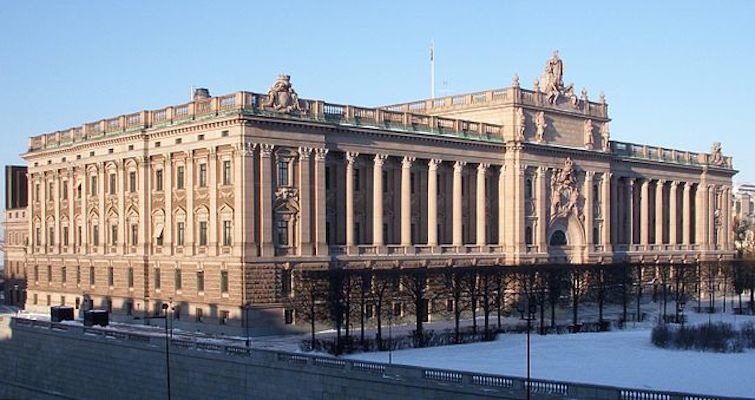Sweden’s ruling center-left government, elected only in September and led by the Social Democratic Party, will live to fight another day after reaching a deal with the mainstream center-right opposition (led by the so-called “Moderate Party”) to support the Moderate Party’s proposed budget this year instead of their own but avoid going to early elections. The extreme right was expected to make big gains if elections were held within just six months of their last big jump and less than a year after their big performance in EU elections.
This is a bad deal but probably still worth taking, at least in the short term. It’s worth taking in that it avoids that dangerous election and will commit the mainstream opposition to supporting the government’s budgets through 2022, after this one. But it’s bad in that adopting the opposition’s proposed budget even this year is kind of the opposite of what is supposed to happen when they lose an election and it effectively constitutes political extortion (much like U.S. Republicans extorting concessions for vital debt ceiling increase votes).
In the long run, that means the mainstream left is likely to lose even more support for being “sellouts,” while the mainstream right continues to be extremely unpopular. The only clear upside, besides the immediate prevention of a risky snap vote, is that it pushes the next election out to 2022 and avoids several future budget showdowns, which is still a better outcome than most recent U.S. budget and debt ceiling fights.
What should have happened here is either a Grand Coalition between the two biggest mainstream parties or the main center-right party holding their noses to vote through a center-left budget instead of trying to tank it, as they did. That’s what a losing but responsible conservative party would do to avoid strengthening the far-right, particularly in a week that saw 2 different mosques attacked by Swedish extremists trying to burn people alive and vandalize property.
Instead, the “Moderate Party” extorted the ruling Social Democrats (and Green Party) by demanding their budget proposal be adopted anyway. Their budget is, in fact, the polar opposite of what the Swedish population has been demanding and had been a factor in the rise of the extreme right.
In the last 8 years, Sweden became the economy with the fastest growing income inequality in the industrialized world. The previous, Moderate-led center-right coalition government in Sweden pursued not just an austerity agenda — like many of their peers (on both sides of the center) across Europe during the recent crisis — but they also pursued an aggressive effort to roll back government services and programs and introduce private sector participation in functions traditionally managed by the Swedish state.
Although some of the policies were introduced in the 1990s, they were ramped up even more in recent years. In particular, Swedish government attempts to privatize and voucherize public education — along the lines promoted by many right-leaning education “reformers” in the United States — devolved into a mess. One recent poll, by Gothenburg University’s SOM Institute, found that ahead of the September elections 70% of the country was opposed to the privatization and corporate subsidy schemes of the Moderate Party government that subsequently lost.
In the September general election, the mainstream center-left Social Democrats won the most seats in Sweden’s parliament, but they also finished with one of the party’s lowest vote shares of any election held after the 1909 reform that granted male workers the right to vote. That’s because many of the seats previously won by the mainstream center left and right were lost to smaller parties. Most notably, a far-right, anti-immigrant party, the Swedish Democrats became the third biggest party in Swedish politics.
Neither mainstream party will allow the Swedish Democrats into a coalition government, but with the fragmentation that occurred on the left, and the small size of the non-extreme parties on the right, the Swedish Democrats effectively holds the balance of power in parliament anyway unless a grand left-right coalition or minority government arrangement were to be worked out. The Social Democrats and Greens were able to cobble together a 138 seat coalition, but that was still 37 seats short of a majority. That’s why the ruling Social Democrats were forced to get budget votes from the opposition Moderate Party (and their opposition “Alliance” coalition that cumulatively holds 141 seats) or call a snap election. When the government’s proposed budget failed earlier this month, they had to announce elections and/or try to get a deal like the one they just got.
As we’ve covered before on this site, European mainstream politics right now are facing a very serious challenge from both a splintering but growing far-left as well as a dangerously solidifying, growing, and extreme far-right.
Between apathy with the system / existing parties and enthusiasm among those seeking easy but dangerous answers, we have the left growing but splitting its votes and the extreme right-wing unifying into a dangerous political force. The depth and duration of the economic crunch in Europe, crossed with the resulting cutbacks of government spending and jobs, has put a lot of voters in the mood to vote for anybody but the mainstream parties when they head to the polls. That is the space exploited to allow parties like the Swedish Democrats to make big gains.
If the Moderate Party were true to their name and were responsible actors who don’t want to see the extremists rise to power, they would have accepted the budget of the ruling party. Instead, they selfishly extorted the Social Democrats for their own ends, knowing that they were in a very precarious position. The Swedish voters have made very clear they did not want this budget or any budget from the Moderate Party. Down the line, this deal is likely to backfire, even if it momentarily avoids a political crisis that could have strengthened the extremist Swedish Democrats.

Parliament House in Sweden. Credit: Holger.Ellgaard via Wikimedia


